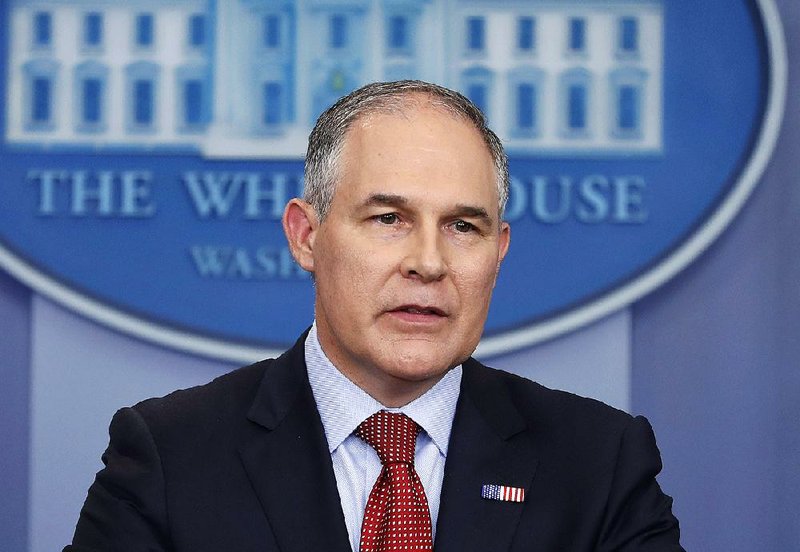WASHINGTON -- A lawyer representing the Environmental Protection Agency says an internal task force appointed to revamp how the nation's most polluted sites are cleaned up generated no record of its deliberations.
EPA Administrator Scott Pruitt in May announced the creation of a Superfund Task Force that he said would reprioritize and streamline procedures for remediating more than 1,300 sites. Pruitt, the former attorney general of Oklahoma, appointed a political supporter from his home state with no experience in pollution cleanups to lead the group.
The task force in June issued a nearly three-dozen-page report containing 42 detailed recommendations, all of which Pruitt immediately adopted. The advocacy group Public Employees for Environmental Responsibility quickly filed a Freedom of Information Act request seeking a long list of documents related to the development of Pruitt's plan.
After the agency didn't immediately release any records, the advocacy group sued.
Now, nearly six months after the task force released its report, a lawyer for EPA has written to the group to say that the task force had no agenda for its meetings, kept no minutes and used no reference materials.
Further, there were no written criteria for selecting the 107 EPA employees the agency says served on the task force or the background materials distributed to them during the deliberative process for creating the recommendations.
According to Johnny Walker, a Justice Department lawyer representing the EPA, the task force also created no work product other than its final report.
Jeff Ruch, the executive director of Public Employees for Environmental Responsibility, said that seems unlikely.
"Pruitt's plan for cleaning up toxic sites was apparently immaculately conceived, without the usual trappings of human parentage," Ruch said. "It stretches credulity that 107 EPA staff members with no agenda or reference materials somehow wrote an intricate plan in 30 days."
In a statement issued Wednesday after The Associated Press first reported on Walker's response in the freedom of information lawsuit, EPA's press office sought to distinguish between the environmental agency and its legal representation.
"The communication at issue was sent by the Department of Justice, U.S. Attorney's Office of D.C., as part of an ongoing effort to resolve litigation," said Jahan Wilcox, an EPA spokesman.
The Justice Department routinely represents executive agencies in legal disputes over Freedom of Information Act requests. Wilcox did not respond to follow-up questions about whether the lawyer's representation was inaccurate or if EPA possessed additional records it has yet to disclose.
The recommendations adopted by Pruitt include prioritizing cleanup sites that can be redeveloped for new construction or where nearby residents are under threat from spreading pollution. EPA held no public hearings about the plan.
Pruitt has pledged to make mitigating decades-old pollution EPA's core mission, even as he has moved to block or delay Obama-era regulations aimed at curbing ongoing contamination from coal-fired power plants and fossil-fuel production.
President Donald Trump's proposed 2018 budget seeks to cut the program by 30 percent. Congress has not yet approved a budget for the current fiscal year, which began in October.
The task force was led by Albert "Kell" Kelly, whom Pruitt hired at EPA as a senior adviser at an annual salary of $172,100. Kelly was previously the chairman of Tulsa-based SpiritBank, where he worked as an executive for 34 years.
A Section on 12/21/2017

